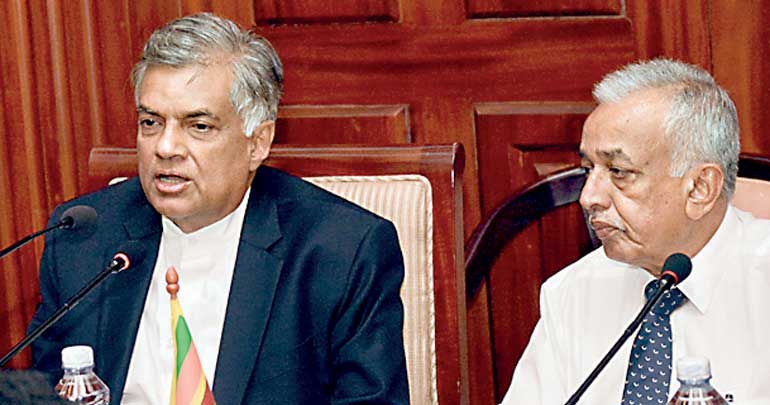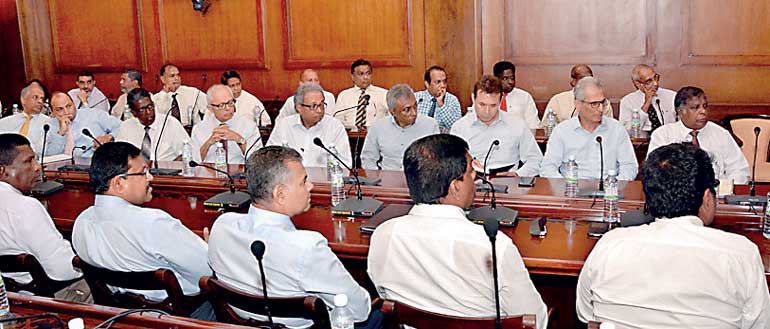Thursday Feb 19, 2026
Thursday Feb 19, 2026
Wednesday, 12 August 2015 01:07 - - {{hitsCtrl.values.hits}}


Prime Minister Ranil Wickremesinghe and UNP Chairman Malik Samarawickrama during yesterday's meeting with exporters (left)
- Pix by Upul Abayasekara
By Himal Kotelawala
The European Union (EU) is set to once again grant Sri Lanka the GSP Plus concession during the first quarter of next year or some time thereafter, Deputy Minister of Policy Planning and Economic Development Dr. Harsha de Silva said yesterday.
Speaking to the media at Temple Trees following discussions held between apparel exporters and Prime Minister Ranil Wickremesinghe, Dr. de Silva said the concession would benefit those exporting to the EU by at least 12%.
There is a catch, however. According to Dr. de Silva, exporters must increase the wages they pay their employees and also increase their EPF and ETF contributions.
“The exporters have agreed unanimously to this. We are extremely happy to have been able to come to this agreement, and we are hopeful that not only some of the companies that have been already shut down will reopen, but the existing companies will be able to expand their services and create better paying jobs in the near future,” he said.
Responding to a question by the Daily FT, the Deputy Minister said the EU had not imposed any fresh conditions on the country in granting the GSP Plus concession.
“We have been working with the EU very closely. The Prime Minister’s Ministry of Policy Planning and Economic Affairs has been taking the lead. And I have personally met with the high official of the EU. We are very hopeful that within a matter of months Sri Lanka will be able to get the GSP Plus back,” he said.
Sri Lanka need not adhere to any new commitments to qualify for the facility, other than agreements already entered into in order to ensure that there is fair play, equity and justice in the country, he added.
Addressing concerns about investors opting to set up shop in Bangladesh following the loss of GSP Plus and high production costs in Sri Lanka, Dr. de Silva said that the Government was not interested in competing with Bangladesh at the lower end of the market, but instead the plan was to create a highly competitive economy.
“In fact, what we want to create is the most competitive economy in this part of the world. So if we are going to be able to add greater value to apparels, if we can brand the apparels, if we can sell in the higher end of the market, I think we’ll have a natural niche. We are obviously unable to compete with Bangladesh at the low end of the market and we don’t want to compete with Bangladesh at the low end of the market. That is not our objective. Our objective is to create a highly competitive economy,” he said.
Elaborating on this, the Deputy Minister said that in creating a highly competitive economy, Sri Lanka would have to start producing highly competitive goods and services, by infusing more technology, new innovations and new ways of doing business.
“We are not going to be too worried about the business we lost to Bangladesh or Vietnam in terms of the wage differentials. We want to attract new investors, new types of businesses, value-added products and services,” he said.
Responding to a question about higher salaries in Sri Lanka’s export industry in comparison to countries like Bangladesh and Vietnam possibly dissuading potential investors, Dr. de Silva said that this was a myth and that, in fact, salaries in this country needed to be increased.
“The absolute amount of the salary is immaterial. What we are looking for are high salaries. Certainly we want to pay high salaries for Sri Lankans. We don’t want to create a Sri Lanka with low salaries. But in order to pay high salaries, we’ll have to produce goods and services that are competitive and are of higher quality and of higher value. That is what we want to do. We are not going to be pushed into this silly trap of saying ‘no, you can’t pay salaries, because already costs are high and we are competing in the market for low cost, low value products.’ We have to move away from this myth that salaries are high in Sri Lanka. Salaries in Sri Lanka are not high and must increase manifold. But in order to do that we have to create competitive industries,” he said.